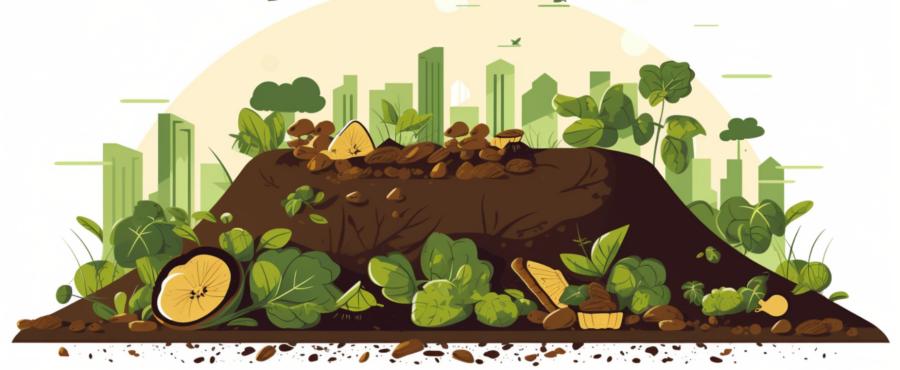Composting Basics for Urban Dwellers

Introduction to the Wonders of Composting
Composting, my friends, is a miraculous process that turns the remains of yesterday's lunch into a rich, dark, earthy substance that plants absolutely adore. It's like a secret handshake or a password to the realm of Mother Nature's inner circle. And let me tell you, oh my fellow urban dwellers, that you too can become a member of this exclusive club, even if your primary exposure to nature is the occasional pigeon landing on your window sill.Why Bother Composting in the City?
Now, you might be asking yourself, "Why on earth would I want to start composting in the concrete jungle?" Well, for starters, think of all the scraps of food that you toss into the trash. Those biodegradable morsels are unceremoniously dumped into a landfill, where they're smothered under layers of plastic and other non-biodegradable materials. This stifles the natural decomposition process, resulting in a release of methane, a potent greenhouse gas that's no friend to our fragile planet.By composting, you're not only reducing the amount of waste you produce, but you're also creating a rich, fertile soil amendment that can be used to grow plants, even if your "garden" consists of a few pots on a balcony or windowsill. You'll be turning your food waste into a valuable resource that can help nurture new life. Call it the circle of life, the cycle of matter, or just plain poetic justice - it's a beautiful thing.
The Science of Composting, Simplified
Composting is essentially the decomposition of organic material by microorganisms, which produce heat and break the matter down into smaller and smaller pieces. Various fungi, bacteria, and other microscopic organisms go to work, munching away on your food scraps and turning them into humus, a nutrient-rich soil amendment that plants absolutely adore.Now, if you're envisioning a mad scientist's laboratory with bubbling beakers and test tubes, fear not! The process of composting is much simpler than you might think. You don't need a degree in biology or chemistry to create your own composting operation - just a bit of space, some patience, and a willingness to get your hands dirty (literally).
Setting Up Your Urban Composting Station
There are several methods of composting that work well in an urban environment. You can choose the one that best suits your available space and personal preferences. Here are a few options:- Worm composting (vermicomposting): Yes, my friends, worms can be your new best friends when it comes to breaking down your food scraps. A worm bin, which you can purchase or make yourself, holds red wiggler worms (Eisenia fetida) that eat their way through your organic matter and produce nutrient-rich castings. This method is great for small spaces and can even be done indoors, as it's relatively odor-free.
- Bokashi: A Japanese method of fermenting organic waste, bokashi involves layering food scraps with a mix of microorganisms (usually available for purchase), which help break down the waste anaerobically (without oxygen). The resulting "pre-compost" can then be added to a traditional compost pile or buried directly in the ground. This method works well in small spaces and helps control odors.
- Traditional composting: If you have a bit more outdoor space, you can set up a compost bin or pile to hold your food scraps, yard waste, and other organic materials. Layering "greens" (nitrogen-rich materials like grass clippings and kitchen scraps) with "browns" (carbon-rich materials like leaves and shredded newspaper) helps maintain a good balance for decomposition. Turn the pile occasionally to aerate it and encourage the composting process.
Composting Dos and Don'ts
To ensure that your composting operation runs smoothly, here are a few basic guidelines:- Do include a variety of materials, such as fruit and vegetable scraps, coffee grounds, eggshells, and grass clippings.
- Don't include meats, dairy products, fats, or oils, as they can attract pests and produce unpleasant odors.
- Do chop or shred materials into smaller pieces, as this will help them break down more quickly.
- Don't add pet waste or diseased plants, as they can introduce pathogens to your compost.
Article kindly provided by yourhomengarden.org
Latest Articles
- Bed Size Psychology and the Quiet Power of Space
- Why Your Front Door Fails Before the Lock Does
- How Tiny Entry Points Turn Into Big Pest Problems
- Why Soil pH Matters More Than You Think for a Healthy Lawn
- Hidden Energy Loss at the Roofline and How to Fix It
- Moisture Mischief and Wooden Floors: What Your Boards Are Trying to Tell You
- Foot Traffic Maps: How to Strategically Protect High Wear Areas on Wood Floors
- Clearing the Clutter Without Losing the Plot
- Why Damp Feels Worse in Some Rooms Than Others
- The Hidden Health Benefits of a Deep Clean
- Uncommon Ways to Estimate Waste Volume Before a Cleanup Project
- How to Spot and Tackle Hidden Moisture Problems Before They Become Renovation Nightmares
- How Underground Pipe Issues Can Lead to Structural Damage
- Simple Design Tricks That Encourage Backyard Biodiversity
- Why Your Showerhead Is Suffering From a Mineral Midlife Crisis
- Gateways That Turn Heads While Keeping Your Property Safe
- Listening Pipes: Using Sound to Diagnose Hidden Home Plumbing Issues
- Small Changes That Make a Kitchen Feel Completely New
- Scents That Refuse to Leave and How to Outwit Them
- How Personalisation Makes Homewares Feel Special
- Interior Design
- Home Improvement
- Gardening
- Home Organization
- Home Maintenance
- DIY Crafts
- Kitchen and Dining
- Bathroom Design
- Home Security
- Home Automation
- Green Living
- Home Office
- Home Decor
- Garden Design
- Pet Care
- Home Technology
- Landscaping
- Home Energy Efficiency
- Home Cleaning
- Home Safety
- Home Exterior
- Home Insulation
- Home Buying
- Home Selling
- Renting
- Tradespeople
- Garage
- Bedroom
- Painting and Decorating
- Plumbing and Drainage

